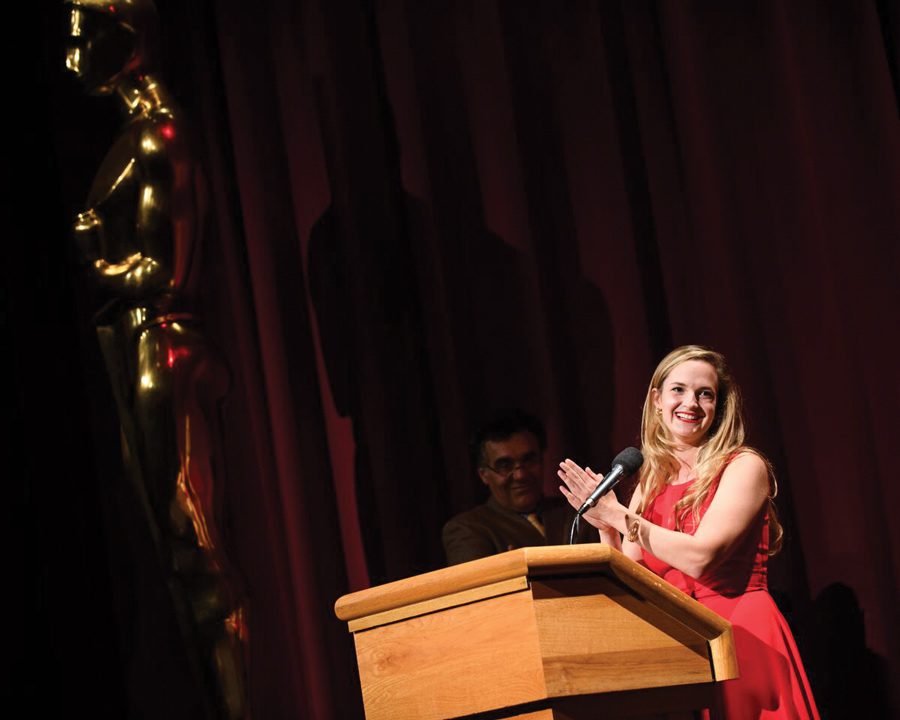Northwestern alumna wins Academy screenwriting fellowship
Sarah Jane Inwards (Communication ’13) is one of this year’s recipients of The Academy’s Nicholl Fellowship award. Winners are given $35,000 to create a new screenplay within the year.
November 16, 2017
A&E
At just 26 years old, Sarah Jane Inwards has exceeded the average expectations of a recent college graduate. Rather than an entry-level job with decent benefits, Inwards is making strides on Hollywood Boulevard as an up-and-coming screenwriter.
Inwards (Communication ’13) is one of this year’s recipients of The Academy of Motion Picture Arts and Sciences’ Nicholl Fellowship awards, which identify talented new screenwriters and give them support for their art. Winners receive $35,000 to create a new screenplay within the year.
The Academy received more than 7,000 applications and selected only five finalists, including Inwards. Hollywood producer Julia Chasman, who presented Inwards the award at a Nov. 2 ceremony, praised Inwards’ empathy as a screenwriter.
“Sarah Jane puts her ideals into her writing, creating stories that inspire compassion and deal with issues of social justice,” Chasman said at the event.
Inwards won for her screenplay “Jellyfish Summer,” which she is currently pitching to producers, she said. The film tells the story of a young black girl in the 1960s whose family decides to harbor two mysterious refugees who have come from the sky.
She described the genre of the film as a “historical-fiction, sci-fi combo.” Chasman called it “an unexpected and surprisingly moving tale full of surprises” in her Academy introduction speech.
The screenplay’s underlying message addresses the difficulties refugees face, Inwards said. Inwards has a background in the subject; while at Northwestern, she did an independent study on the Bosnian Genocide, for which she conducted research and interviewed survivors.
Inwards said she used her research as a starting point for determining how to address the issue in her screenplay.
Most of Inwards’ screenplays incorporate social justice issues, but she said she doesn’t like to present these topics through “straight dramas.” Instead, she said she likes to play with genres and twist them around to create something unique and imaginative.
“The best way to describe my work is ‘marketable with a message,’” she said. “It’s like hiding the vegetables in the meatloaf.”
Alec Ziff (Communication ’13), a longtime friend, said Inwards isn’t just an empathetic writer; she’s a very caring colleague and friend.
“You know when you meet someone and you’re like, ‘Oh they’re so nice, they must be faking it.’ She’s not,” Ziff said. “She’s just genuinely a very kind and loving person and that comes across the moment you meet her.”
Inwards credits the struggles she faced in her youth as the impetus for her empathy. She was born with gastroschisis, a condition where infants are born with their intestines outside their body.
The condition flared when Inwards was at NU, forcing her to undergo multiple open abdominal surgeries and even spend a brief time in the intensive care unit, she said. Inwards is healthy now, but the experience has stayed with her and informed her writing.
“(Those years were) really formative for me in terms of taking what I loved to do and figure out how to give back,” she said.
In a pursuit to combine her passion for film with her desire to help others, Inwards co-created Applause for a Cause with Ziff in their sophomore year of college. The group, now in its eighth year, creates a feature film every year and donates all of the proceeds from ticket sales to charity.
Inwards said it was no coincidence the first couple of charities — Ronald McDonald House and Make-A-Wish Foundation — were medically skewed, as she felt the need to make a difference in the lives of others who were going through medical difficulties like her.
Inwards’ medical connection runs deeper than her personal health, as both of her parents are doctors. While Inwards said they have been supportive of her career choice, in her Nicholl acceptance speech she expressed doubts whether her work makes as much of a difference as theirs. Her father had some sage advice.
“He said, ‘Some people save lives; some people make them worth living,’” she said.
Email: janerecker2019@u.northwestern.edu
Twitter: @jreck96



